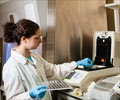Noninvasive prenatal testing including all 23 pairs of chromosomes discovers rare trisomies that suggest feto-placental diseases and miscarriages.
- Current prenatal testing includes testing for chromosome abnormalities mostly limited to chromosomes 13, 18, 21, X and Y.
- Any normal cell in the body has 23 pairs of chromosomes and any deviation results in diseases like Downs Syndrome and the like
- Scientists have shown that genetic tests aimed at testing all the chromosomes detect rare trisomies may be suggestive of miscarriages and other pregnancy related diseases.
Non-invasive prenatal testing (NIPT)
Prenatal testing is done to check the health of the unborn baby. Prenatal genetic testing is usually only done in case there is a prior issue related to the pregnancy. Prenatal genetic testing is recommended when there is any of the following;
- Previous child with a genetic defect
- Increased maternal age
- Family history of genetic disease or affected children
- Miscarriages and abortions
Genetic Analysis:
Genetic tests include whole genome sequencing, targeted sequencing and microarray check for deletions, duplications, repeats among others. However, the most common is the count of the chromosomes which is determined by a test called karyotyping. A normal cell contains 22 pairs of somatic chromosomes and two X chromosomes in case of a girl and X and Y in case of a boy. Genetic defects are caused due to any deviation from this number. Trisomies are very common; in this case instead of a pair of chromosomes, there is three.
The Problem with NIPT:
Despite the increased accuracy of genetic testing when compared to the non-genetic assays, a small percentage of the fetal DNA from maternal blood tests can be complicated. This is either due to atypical findings or discordance with the fetal karyotype.
Standard NIPT typically considers only the chromosomes that are most frequently found to be abnormal, for example trisomic (triple) - chromosome 13, 18, 21, X and Y.
Latest Study Findings:
While genetic testing of all chromosomes showed several abnormalities, including copy number variants and deletions, trisomy of the non-target chromosomes was the single most common finding between both cohorts. Trisomies that were not associated with the typical target chromosomes including chromosomes 13, 18, 21, X and Y, were called rare autosomal trisomy.
Trisomy 7 was the most frequently observed rare autosomal trisomy in both cohorts followed by 15, 16 and 22. Clinical data indicated that rare autosomal trisomies were associated with early miscarriage, in-utero fetal demise, intrauterine growth restriction etc.
Reference:
- Pertile,M. D., Halks-Miller, M., Flowers, N., Barbacioru, C., Kinnings, S. L., Vavrek, D.,Bianchi, D. W. (2017). Rare autosomal trisomies, revealed by maternal plasma DNA sequencing, suggest increased risk of feto-placental disease. Science Translational Medicine,9(405). doi:10.1126/scitranslmed.aan1240
Source-Medindia















